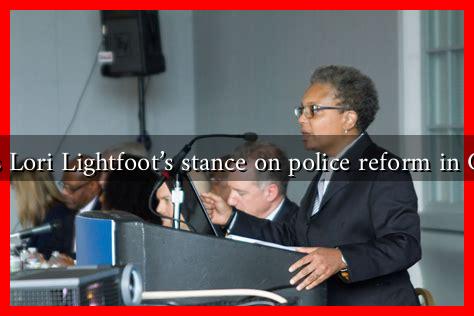-
Table of Contents
What is Lori Lightfoot’s Stance on Police Reform in Chicago?
As the first African American woman and openly gay mayor of Chicago, Lori Lightfoot has faced significant challenges during her tenure, particularly regarding police reform. The issue of police accountability and community safety has been at the forefront of her administration, especially in the wake of high-profile incidents of police violence and systemic racism. This article explores Lightfoot’s stance on police reform, the initiatives she has implemented, and the challenges she has faced in this complex landscape.
The Context of Police Reform in Chicago
Chicago has a long and troubled history with its police department, characterized by allegations of misconduct, excessive use of force, and a lack of accountability. The murder of George Floyd in May 2020 ignited nationwide protests and renewed calls for police reform, placing additional pressure on local leaders, including Lightfoot, to take decisive action.
Lightfoot’s Vision for Police Reform
Mayor Lightfoot has articulated a vision for police reform that emphasizes accountability, transparency, and community engagement. Her approach can be summarized through several key initiatives:
- Creation of the Office of Public Safety: In 2021, Lightfoot proposed the establishment of a new office aimed at overseeing public safety strategies, including police reform.
. This office is intended to provide a more coordinated approach to public safety, integrating various community services.
- Investment in Mental Health Services: Recognizing that many police encounters stem from mental health crises, Lightfoot has advocated for increased funding for mental health services. This includes the expansion of crisis intervention teams that can respond to emergencies without police involvement.
- Body Cameras and Technology: Lightfoot has supported the implementation of body cameras for police officers, aiming to increase transparency and accountability. The city has invested in technology to improve data collection and analysis related to police interactions.
- Community Policing Initiatives: Lightfoot has emphasized the importance of community policing, which fosters relationships between officers and the communities they serve. This approach aims to build trust and reduce tensions between law enforcement and residents.
Challenges and Criticisms
Despite her efforts, Lightfoot’s approach to police reform has not been without challenges and criticisms:
- Resistance from Police Unions: Police unions have often pushed back against reform measures, arguing that they undermine officers’ ability to perform their duties effectively. This resistance has complicated Lightfoot’s efforts to implement significant changes.
- Community Distrust: Many community members remain skeptical of the police, viewing reform efforts as insufficient. High-profile incidents of police violence continue to erode trust, making it difficult for Lightfoot to gain widespread support for her initiatives.
- Budget Constraints: The COVID-19 pandemic has strained city budgets, leading to difficult decisions about funding for police versus social services. Balancing these needs has proven to be a significant challenge for Lightfoot’s administration.
Case Studies and Examples
One notable example of Lightfoot’s commitment to police reform is the implementation of the Consent Decree following a federal investigation into the Chicago Police Department. This decree mandates comprehensive reforms, including changes to training, use of force policies, and community engagement practices. The progress of these reforms is monitored by an independent federal judge, ensuring accountability.
Additionally, Lightfoot’s administration has focused on reducing gun violence through community-based programs. For instance, the city has invested in violence interruption programs that employ trained community members to mediate conflicts before they escalate into violence. These initiatives have shown promise in reducing crime rates in certain neighborhoods.
Conclusion
Lori Lightfoot’s stance on police reform in Chicago reflects a commitment to accountability, transparency, and community engagement. While she has implemented several initiatives aimed at transforming the police department and improving public safety, significant challenges remain. Resistance from police unions, community distrust, and budget constraints complicate her efforts. As Chicago continues to grapple with issues of police violence and systemic racism, Lightfoot’s leadership will be crucial in shaping the future of policing in the city.
For more information on police reform initiatives in Chicago, you can visit the City of Chicago’s official website.





